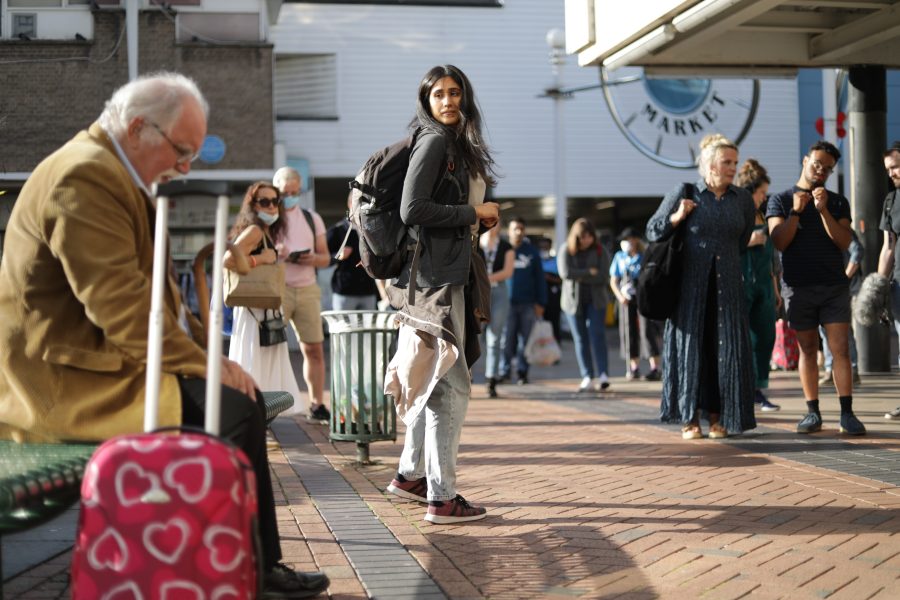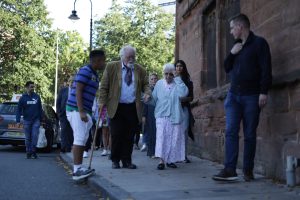Theatre of Wandering: Rehearsal and devising notes [Part 2]
Coventry UK City of Culture 2021 commissioned Entelechy Arts to create a new version of Theatre of Wandering working with OiBokkeShi, the Belgrade Theatre’s Arts Gymnasium and people from across Coventry, crafted from their experiences and reflections about care and what it is to live with dementia. In Part 1 of this blog Entelechy Arts Associate David Slater described the processes of constructing the supportive frameworks, necessary for holding the processes of devising, preparing and performing the story with people of all ages who live and work in the city. Part 2 describes how the performance was made together.
Making it up together: the ambiguous art of co-production
The plan had always been to create Theatre of Wandering together. We would make it up (co-create) collectively. But no matter how meticulously you structure a relationship building programme there comes a moment when you have to step out precariously into the unknown. Theatre-making in community is conversation with community. Artists can make overtures but can never predict how or where a conversation will end.
We began with two interweaving threads of the story first created by our partners OiBokkeShi on streets Okayama, Japan, four years ago. An older man wandering the streets desperately searching for his wife who is living with dementia; a younger person tentatively arriving back in their home city after a long absence. Both of these narrative fragments spoke of care and its relationship to the city space. They held questions about where our public and private worlds intersect.
We began with four months of meetings, workshops, chance conversations and days of wandering across many spaces and places in the city. Formally and informally we gathered together a loose confederation of local artists, health workers, producers, care workers, older performers, people living with dementia, local shop keepers, community workers, police personnel and local residents.
Everyone we spoke to intuitively understood the need to uncover and share the story. One in three older people in our communities is living with dementia. The story touches almost everyone’s lives. Many who we met wanted to be a part of the process and the core creative team rapidly expanded into a much broader devising and performing company.
People new to theatre-making walked into the devising and rehearsal sessions with the authority of their own lived experiences. Place and time became key factors in the design of an inclusive devising process. Sessions had to be timetabled with a flexibility that took into consideration people’s planned hospital visits, work shifts, availability of carers and individual stamina. A fluidity of devising spaces allowed the play to seep into the city and the city to seep into the play; a sense that the performance was being created across many people’s home ground. We worked in front rooms, pubs, church halls, a police station, a GP surgery, in a market and on the street.
New company members introduced new characters to the story. New characters bought new knowledge. New knowledge bought new consequences. The story took on a life of its own.
In the creation of Theatre of Wandering we aspired to make meaningful work, forged from the interdependent imaginations and experiences of a diverse company of people. The recognition that everyone had something of significance to contribute to the shape, form and content of the work was key to the creation of a theatre that questioned and explored ideas about care and the city. Narratives about dementia force us to explore ways of comfortably living with difference, change and uncertainty. Everyone in the company had distinctive and unique perspectives to contribute ranging from people with lived experience of dementia to clinical psychologists from local memory teams. The interdependent structures that were forged within the company created safe and caring spaces to explore difficult stories and experiences.
The recently published Care Manifesto from the Care Collective states that: ‘Issues of care are not just bound up with the intimacy of very close relationships such as family or kinship. They also take shape in the environments we inhabit and move through – in local communities, neighbourhoods, libraries, schools and parks, in our social networks, and groups we belong to’. In co-creating Theatre of Wandering we uncovered and performed the story on the streets and public spaces of the city. It took shape in the spaces and places where everyone lived or worked.
At the beginning of the play, Ollie, the grandson of the older couple George and Annie, introduces the play to the gathering audience on the street: “Because like my nan says: stories don’t just happen – people make stories happen. And if we look after each other, the story will look after itself.”
And in the end that’s what happened. We looked after each other and the story looked after itself.
Photos by Ayesha Jones.
Discover more about Theatre of Wandering:
–Watch the film
–Listen to the podcast
–Read Part 1 of this blog
A Coventry UK City of Culture 2021 and Entelechy Arts co-production, in association with OiBokkeShi, the Belgrade Theatre Coventry and Belgrade Arts Gym group. Kindly supported by Arts Council England, Spirit of 2012, Community Fund, Daiwa Foundation and Japan Foundation.



